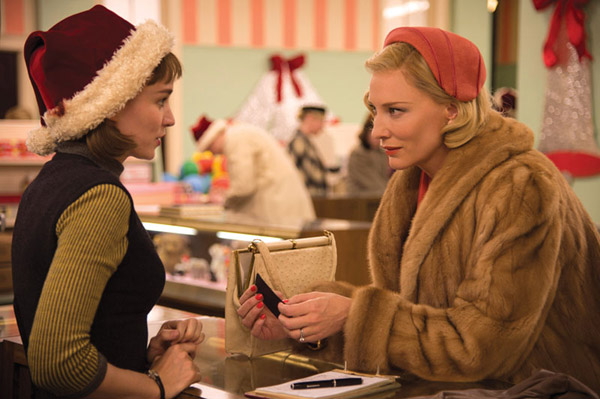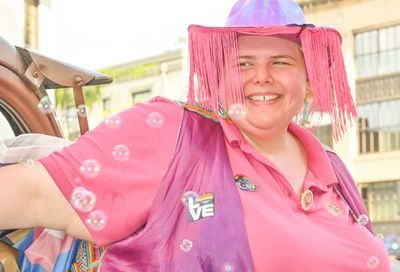Carol: Terms of Endearment (Review)
Exquisite, masterful and thoughtful, Carol is a pinnacle achievement for director Todd Haynes

Carol, the sixth feature from Todd Haynes, has the feel of a career pinnacle, as though every other film in his canon — and he’s directed some masterful, though at times idiosyncratic, films — was building to this masterpiece. Based on the novel The Price of Salt by Patricia Highsmith, the movie is the lesbian equivalent of Ang Lee’s Brokeback Mountain. But Carol (![]()
![]()
![]()
![]()
![]() ) is arguably more emotionally satisfying than Lee’s film, in part because of the way Highsmith, herself a closeted lesbian (the author penned the novel under a pseudonym), crafted the story of a young shopgirl who falls in love with an older woman and embarks on a journey of self-discovery.
) is arguably more emotionally satisfying than Lee’s film, in part because of the way Highsmith, herself a closeted lesbian (the author penned the novel under a pseudonym), crafted the story of a young shopgirl who falls in love with an older woman and embarks on a journey of self-discovery.
Published in 1952, The Price of Salt has long been regarded as a key lesbian novel, in part because, at the time, its happy(ish) ending was a rarity in the world of gay and lesbian literature. Gay characters in fiction, when they were present at all, didn’t embrace their sexuality in the ’50s. They fled from it, they hid, leading presumably lonely, desolate lives. They committed suicide or, as with Highsmith’s Strangers on a Train and The Talented Mr. Ripley, were seen as psychopaths and sociopaths. The Price of Salt tipped that notion on its side; it was obviously a wish-fulfillment for Highsmith, who, by most biographical accounts, was a bitter, unhappy person (her misogyny and anti-Semitism are well-known), possibly due to a lack of romantic fulfillment.
Working from a screen adaptation by Phyllis Nagy, Haynes remains faithful to the book’s narrative, as well as to the aesthetics of the period. The result is something exquisite, out of time, elegant and otherworldly. Carol doesn’t feel like a contemporary film representing a time period, but rather a genuine throwback to the movies of the ’50s. Despite the lack of a suspense-driven narrative, it effortlessly evokes the spirit of Alfred Hitchcock. Carol could be a distant cousin to Vertigo.
This isn’t Haynes’s first time to the period-drama well. In 2002’s Far From Heaven, he paid homage to the technicolor-saturated melodramatics of Douglas Sirk, crafting a movie that somehow, miraculously resonated on a primal, emotional level. While Far From Heaven cleaved to Sirk’s garish approach, it dealt with topics that, in its own time-period, were taboo. Carol is similar, but Haynes takes a more refined, deliberate approach, evoking the ’50s in a way that is both transporting and transcendent, a finely-tuned straddle of clinging warmth and frigid chill. And, unlike so many films these days, Carol takes its time, with Haynes resolutely refusing to hurry things along. Some in the audience might find the approach dull. It’s not. It’s captivating, absorbing, all-encompassing. It’s the way movies used to be made, an instant-born classic.
While the storyline has its twists and turns, it remains, at its core, fairly straightforward. Socialite Carol Aird (Cate Blanchett) is waited on by department store clerk Therese Belivet (Rooney Mara), and the immediate connection between the pair virtually lunges off the screen. It’s not a fully defined relationship at first — rather, it’s a slow, gradual courtship for Carol and a splash-of-cold-water awakening for Therese. Haynes is smart not to rush into the sex — emotions are conveyed by a hand gently rested on a shoulder, or a glance that lingers for longer than it ought to, so that when the women finally do make love, the moment hits with the force of a romantic squall. The intimacy of their lovemaking is so authentic, so deeply felt, so impassioned, it feels as though we’re prying into a private moment and should be averting our eyes.
For a movie that takes its time to get where it’s going, there are a lot of moving parts, including several bursts of uncomfortable drama between Carol and her estranged, confused husband Harge (Kyle Chandler). “How do you know my wife?” he cries out to the wide-eyed Therese, and you can see the deep pain shredding through him. Harge knows what’s happening here and is powerless to stop it.
Haynes, himself, is gay and his sexuality has often informed his work, both in early films like the epic Velvet Goldmine, the shockingly near-pornographic Poison, and in Far From Heaven, where homosexuality is treated as a shameful malady, something unseemly, unspeakable, and in need of curing. Carol mainly approaches same-sex attraction from an intensely romantic viewpoint, but it also veers into the attitudes of the decade, as Harge fights his wife for custody of their daughter, eventually resorting to emotional blackmail in a dinner scene with his controlling parents that, despite its understatedness, is one of the movie’s most shattering sequences. There is much talk from Carol’s divorce attorney about a “morality clause,” and when Carol repeats the words, Blanchett allows them to spill forth as though horrible, heavy bricks were tumbling from her lips. When Carol finally take a stand, it is, to be honest, an improbable, fantasy moment, but it’s immensely gratifying nonetheless, carrying with it a triumphant message that is even more relevant today.
Praise should be lavished on Haynes for his sense of style, his use of color (reds, in particular), his deployment of Carter Burwell’s lilting, lovely music-box score, but the film would be lost without Blanchett and Mara, who give the kinds of performances that Oscars are made for. The chemistry between them is uncanny. Blanchett starts out seeming chilly, almost mildly predatory. Yet it’s merely guardedness. As Blanchett slowly peels away Carol’s layers, we get a first-hand look at the vulnerability and softness that informs who she truly is. The story finds even more resonance in following Mara’s Therese, as she evolves from wide-eyed and innocent to self-assured. There’s a gentle, awkward hesitancy to Therese, and Mara, with her wide eyes, evokes it beautifully. She’s a magnificent actress, fully capable, with just a whisper of “I miss you” into a phone, of breaking your heart.
The cast orbiting these two stars is similarly perfect, including Chandler, John Magaro, Kevin Crawley, Corey Michael Smith and especially Sarah Paulson, gratefully out of her American Horror Story confines, as a take-no-prisoners former lover of Carol’s.
It seems almost diminishing to relegate Carol as merely an LGBT movie, and yet it deserves an immediate spot at the top of the genre’s canon. It’s a thoughtful, exquisite film, one that celebrates the impact of slow-burn cinema as much as it does the power of finding your heart’s desire.
Carol runs 118 minutes and is Rated R for sexuality and adult themes. Now playing at area theaters, including Landmark’s E Street and Bethesda Row.
Support Metro Weekly’s Journalism
These are challenging times for news organizations. And yet it’s crucial we stay active and provide vital resources and information to both our local readers and the world. So won’t you please take a moment and consider supporting Metro Weekly with a membership? For as little as $5 a month, you can help ensure Metro Weekly magazine and MetroWeekly.com remain free, viable resources as we provide the best, most diverse, culturally-resonant LGBTQ coverage in both the D.C. region and around the world. Memberships come with exclusive perks and discounts, your own personal digital delivery of each week’s magazine (and an archive), access to our Member's Lounge when it launches this fall, and exclusive members-only items like Metro Weekly Membership Mugs and Tote Bags! Check out all our membership levels here and please join us today!

































You must be logged in to post a comment.